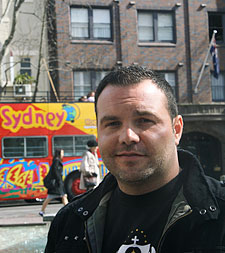Pastor Mark Driscoll has just had three weeks holiday with his family in Sydney, and he’s ready to spend another two weeks speaking to a city of extremes, on the one hand ‘beautiful’ and on the other ‘one of the most selfish cities he’s ever seen’.
It’s not as if the American preacher hasn’t seen the other side of life. He’s speaking at a café in Kings Cross, an area not unlike where he grew up, at the back of a strip club.
Driscoll has begun a round of media interviews in preparation for the Burn Your Plastic Jesus event at the Sydney Entertainment Centre on Wednesday August 27.
 He’s enjoyed the time with his family in a city which he says has a lot in common with New York, London, and Los Angeles, where he’s been recently.
He’s enjoyed the time with his family in a city which he says has a lot in common with New York, London, and Los Angeles, where he’s been recently.
“What I’m finding is it doesn’t matter what city you are in, there are many similarities. Young, heavy technology, heavy gay population, lots of social issues, pornography, lot of abused people sexually. The cities are very, very similar in terms of who’s living there and what they’re struggling with.”
Driscoll is a sponge when it comes to information and already knew a lot about Australia, so he was quick to correct me when I gave him statistics about churchgoing that were a little out of date.
“As I’ve been hanging out in Sydney and doing a lot of statistical research I hope I’ve got my understanding correct on some of the false views of Jesus that permeate Sydney, to correct those with a view of Jesus that’s more biblical.”
He gets his first chance with a weekend address to the Asian Christian group RICE, then Burn Your Plastic Jesus in Sydney, talks interstate, the Engage conference of Katoomba Christian Convention and a ministry intensive in Sydney.
He’s careful not to come across as a pompous American teaching Australians how to suck eggs. But he does have some sharp observations when asked in a video interview for sydneyanglicans.net about his first impressions.
“I find Sydney to be one of the most selfish cities I’ve ever seen in my whole life, to be honest with you. Everything is about my personal happiness. Get married later or don’t get married at all. Have children or don’t have children at all. Go to church or don’t go to church at all. Look out for your neighbour or don’t look out for your neighbour. Whatever makes you happy. Yet, statistically, people are miserable. Anti-depressants are up tenfold in the last decade. Everyone’s depressed, everyone’s smoking, nervous, busy, in debt, scared, lonely and living for themselves and haven’t realised that if you live for yourself, you end up miserable.”
Driscoll answers readers’ questions
In the twenty minute interview, Pastor Driscoll answered a range of questions sent in by sydneyanglicans.net readers.
Who are his theological heroes?
Calvin, Luther, the Puritans, Augustine. Charles Haddon Spurgeon is his favourite. But more recently, “Billy Graham, John Stott, JI Packer and Francis Schaeffer. Fifty years ago they were the fathers, the four horseman of evangelicalism I like to call them. They really started a path that was glorious and in some ways has I think been abandoned. Prosperity gets in, compromise on biblical authority gets in, different issues creep in and I think it’s time to reclaim what it means to be a bible-believing Evangelical.”
Where is he at theologically?
“Theologically I’m classic Protestant reformed Evangelical, so on the big issues I don’t think I know of any differences between me and the Sydney Anglicans. My view is also, though, that I’m a missionary, so I go into culture trying to study and evaluate and try to plant churches in such a way that they fit the cultural context. So I’d say maybe that’s the difference between what I do and what traditional reformed theology did. It tended to import from the Dutch, import from the British, wherever it found its source, and it brought in a lot of style and cultural baggage that I don’t think is helpful.”
How do you guard against a cult of personality?
“In my church I’m not a big deal. There’s a team, about 30 of us now. I’m out six weeks this summer. When I’m out, the other pastors preach. The attendance has not gone down, the giving has not gone down. I don’t run everything.”
How do you combat the ‘prosperity gospel’?
“The key is just keep talkin’ about Jesus. If you’re talking about a homeless guy, its hard to end up with prosperity theology. Jesus does enable some people to be rich, so they can be very generous. But there’s nothing in the Bible that says Christians should expect health and wealth. So I see that as a perverse gospel, its a false gospel.”
How do you balance cultural application, when it can be seen as compromising with the culture and watering down the gospel?
“The gospel always wins. You want to be faithful and fruitful, but at the end of the day if you have to pick one, it’s faithful. It’s not pragmatism, it’s fruitfulness.”


























